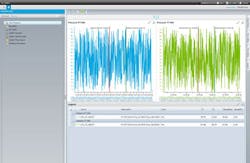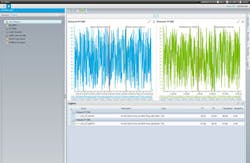Global plastic-film production benefits from consistent data approach
A trip to a grocery store, stop at a fast-food chain or even 20 minutes of TV is about all it takes to convince you we live in a time when food innovation and experimentation runs rampant, both in its tastes and flavors and in how it comes to us.
What makes this frantic search for catchy flavor combinations and form factors even possible is IT-based automation advances in the flexible production of mass quantities of food products.
Packaging advances — including those based on recent materials science break-throughs — lend serious support to these product-differentiation efforts. Food-culture diversification means processed foods must be kept safe and fresh for long times. Rigorously specified plastic film allow consumers to examine food products, while needed "barrier functions" get done better than ever before.
Here too IT-based industrial automation advances are a key ingredient for improving alarm, critical-task and data management of complex industrial processes.
Many different plastics
Food-packaging-film characteristics keep oxygen or water from damaging food quality.
Toray Group is a Japanese-based multi-national corporation with significant presence in the United States, Europe and Asia. Its industrial products involve technologies in "organic synthetic chemistry, polymer chemistry and bio-chemistry." New York-based Toray Industries supplies resin, carbon fibers, fluorofibers and plastic to industrial users.
Toray Industries developed and manufactures polyethyleneterephtalate (Lumirror PET) and polypropylene (Torayfan OPP) high-barrier metalized film. Applications include in renewable energies, imaging, building decor and food packaging. OPP film, for example, is used to make such things as potato-chip bags.
Toray is the main producer worldwide of PET films and market leader for high-barrier OPP films. Besides the United States, production plants are in Japan, South Korea, China and Malaysia.
In Saint-Maurice-de-Beynost, France, Toray Film Europe recently brought on line an OPP film production facility having an annual capacity of 20,000 tons, or the equivalent of 2,000 potato chip bags a minute.
"It’s critical that our processes guarantee that products we deliver meet specifications prescribed by our customers," says Jean-Luc Vianne, IT Project Manager for Toray Films Europe. The installation included a SCADA system that is already a kind of template for the capabilities Toray Films wants for its global production efforts.
What is SCADA?
Supervisory-control systems — acronymized as "SCADA" for "supervisory control and data acquisition systems," — first appeared on the industrial scene more than 20 years ago.
Combined with the basic tool of the automation industry, the programmable logic controller, or PLC, PC-based SCADA software allowed individual engineers to cost-effectively automate supervision and monitoring, although not necessarily direct control, of processes for which they were responsible. Previously, the costs involved meant only the highest-margin processes could receive this kind of attention.
Moreover, in two short decades, supervisory control evolved into an entire approach to plant automation, involving system platforms that allow application integration, sophisticated data management, analytics and advanced process control.
The data historian is another key element of today’s industrial-automation world. Historians are a database application, optimized for serial data, which logs or historicizes time-based process data.
The GE Intelligent Platforms Proficy solution has deep roots and advanced capabilities in industrial SCADA. Toray Films uses Proficy to monitor and report on each phase of its manufacturing process.
From raw-material off-loading to cut-film shipment takes several days. During each phase of manufacture, including melting, minor changes in viscosity, thickness, temperature or output could cause a fluctuation in film quality. Loss of a film batch is a significant expense. Close monitoring allows immediate adjustments.
"If any manufacturing process begins trending in the wrong direction we quickly make a correction and bring that back into alignment," says Vianne.

